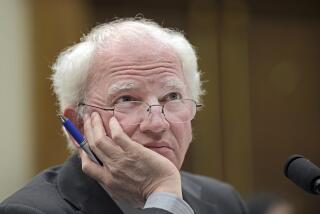Panel Drops Case Against State Appeals Court Judge
- Share via
The California Commission on Judicial Performance has decided to dismiss controversial charges against state appeals court Judge J. Anthony Kline, according to sources close to the commission.
Last July, the commission announced that it had launched disciplinary proceedings against Kline because of a dissent he had written. In the dissent, Kline criticized a decision that had been issued several years earlier by the state Supreme Court and said he could not in good conscience adhere to it because it was “destructive of judicial institutions.”
The commission accused Kline of willful misconduct for defying the Supreme Court. He would have faced punishment up to removal from the bench if the charges were sustained.
The commission decided to drop the case against Kline on an 8-1 vote at a closed meeting Wednesday, sources said. Commission director Victoria Henley issued a written statement saying only that the commission has reached a decision and would issue an order, but there was no elaboration.
Legal experts said the case was the first time that a judicial disciplinary body anywhere in the United States had proposed that action be taken against an appellate judge because of a written decision.
The commission normally investigates charges of conflicts of interest, corruption and abuse of litigants or staff.
The proceedings against Kline, 60, created a firestorm among lawyers and judges around the country. The American Bar Assn. and several local bar associations in California, including the Los Angeles County Bar Assn., urged the commission to drop the charges against the jurist, who has been a judge since 1980 and previously served as Gov. Edmund G. “Jerry” Brown Jr.’s legal affairs secretary.
In a brief filed on Kline’s behalf, the California Judges Assn. argued that sustaining the charges against him “would be a severe blow to the judicial function, to the integrity of judicial institutions and to cherished principles of judicial independence.”
Since Gray Davis was elected governor in November, there has been substantial turnover on the 11-member commission and its cast has become more liberal. All but three members of the commission who initiated the proceedings against Kline have departed.
In addition, a California Supreme Court decision last month, in a case involving a Kern County Superior Court judge, was widely seen as reining in the judicial performance commission.
In that case, the justices ruled that trial judges who make legal mistakes can only be disciplined if there is clear and convincing evidence that they acted in bad faith.
On Friday, Kline said in a brief telephone interview that he had received no official notification of a decision and therefore would decline to comment.
Kline’s attorneys, Shirley Hufstedler of Los Angeles and James Brosnahan of San Francisco, said they had not heard from the commission. But Hufstedler said she hoped that the commission has dismissed the case.
“There has been a serious misunderstanding about the breadth of the authority of the commission,” said Hufstedler, a former federal appeals court judge. The commission, she said, does not have the authority to discipline a judge for refusing to follow a precedent.
Trial judges and appeals court justices are expected to follow precedents set by the Supreme Court, but when they do not the normal remedy is for the Supreme Court to reverse their rulings.
The decision Kline objected to involves a controversial California practice in which parties to a lawsuit can, in effect, wipe earlier judicial decisions off the books if they settle a case.
Critics say the practice allows well-financed litigants to buy their way out of precedents they dislike. The practice, known as “stipulated reversal,” has been banned in federal courts but was upheld for California’s judicial system by the state Supreme Court in 1992.
In the dissent that led to the filing of charges, Kline had taken pains to say that he did not believe he had a blanket right to ignore high court precedents. However, he said that there are rare instances in which a lower court judge may do so.
In particular, Kline and his supporters argue, refusing to follow the precedent was justified in this case because judicial dissent was the only way to bring the issue back to the high court for reconsideration. No litigant would be in a position to bring the issue to the Supreme Court because stipulated reversals only take place once a case has been settled.
More to Read
Sign up for Essential California
The most important California stories and recommendations in your inbox every morning.
You may occasionally receive promotional content from the Los Angeles Times.













